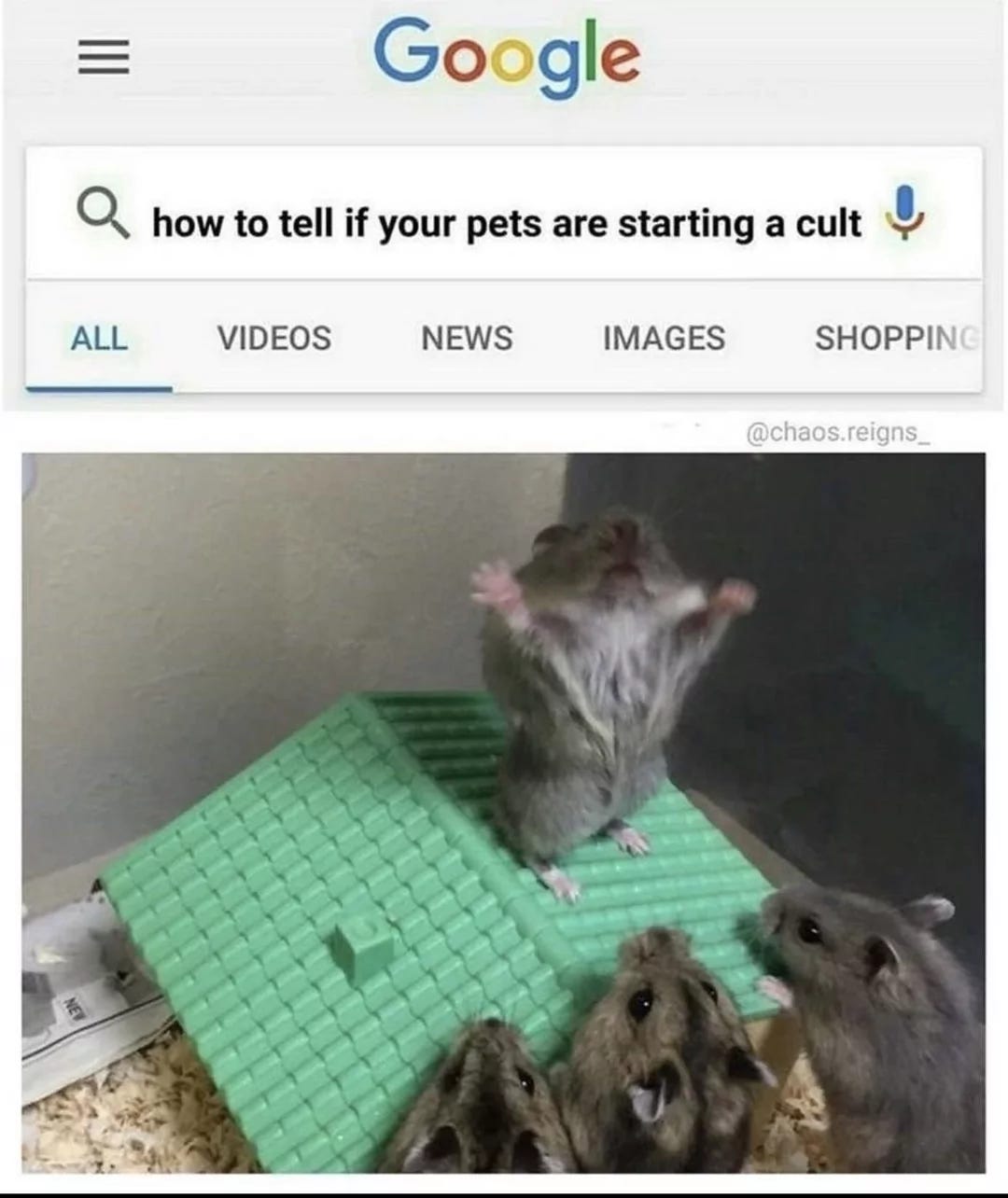Issue Eight: Focus on Cults (Part Two)
"The only difference between a cult and a religion is the amount of real estate they own." - Frank Zappa
If you’re just joining us, The Elevator is a weekly-ish digest of links and content related to consciousness. We are discovering, in compiling the newsletter, that ‘consciousness’ has many aspects. As it should, if the Idealist hypothesis that matter is made from consciousness, rather than the other way ‘round, is correct.
Our purpose is to explore and map what we are calling the Global Consciousness Movement (more in our White Paper, to be published soon). To that end we are looking again at the phenomenon of cults and cult-like groups—what might be called the shadow side to this movement. This time we’re asking: ‘can cult dynamics ever be healthy?’ We’ll leave the answer up to you, once you’ve checked out the links here.
As we said last time, but it bears repeating, our including organizations or individuals in the section titled ‘Focus on Cults’, we are not necessarily implying that they are ‘cults’, are involved with ‘cults’, or even that apparent ‘cult’ dynamics are always negative, even though of course they very often are.
To learn more about The Elevator and to get involved, this page is a good starting point.
Table of Contents
Events
Links
Open Up's Scientific Breathwork study is published, and is presenting promising results
Exploring Neuroplasticity: How the Brain Can Change
Imaginal Inspirations with Anneloes Smitsman - The Galileo Commission
Liv Boeree: The deadly trap that could create an AI catastrophe | TED Talk
Psilocybin and LSD: What I learnt after experiencing 'psychedelic flashbacks' - BBC Future
Zoom Conversations vs In-Person: Brain Activity Tells a Different Tale - Neuroscience News
Psychological and physiological effects of extended DMT
Focus on Cults Part Two
How to Prepare Now for the Complete End of the World
The Druid Renaissance – Lucy Jones
Everybody cults. The only question is how
Immune therapy against conspiracy myths - Alexander von Humboldt-Foundation
Infographic: 50 Cognitive Biases in the Modern World
SHINE — Non-profit supporting survivors of psychedelic harm
Nuggets From The Archive
Sleep may help us to forget by rebalancing brain synapses
Revealed: What your thoughts look like and how they compare to others'
What People See Online Can Take Over Their Trips | DoubleBlind Mag
The neural map is not the territory of consciousness
Bigelow Essays
Events
Dr. David Luke's Talks | Eventbrite
Dr David Luke is Associate Professor of Psychology at the University of Greenwich, UK, where he has been teaching an undergraduate course on the Psychology of Exceptional Human Experience since 2009. David is the founder of Breaking Convention conference. All talks are in-person and in the UK. The first one is in Cardiff on Wednesday, Nov 8, 2023.
Neuroscience of Consciousness Symposium
This looks like a potentially very interesting event: “We want to help propel the paradigm shift in science by organizing a symposium on alternative models of consciousness at the largest annual neuroscience conference.” They have not met the fundraising goal but the latest update says: “We're moving forward with the event. We think this is a very important event and we are still actively fundraising!” The original event was planned for the 11th November 2023 but presumably it will now be later.
Robert Kegan: Immunity to Change Facilitators’ Workshop 15-17 November 2023—online, CET time zone
“Immunity to Change (ITC) is a process designed to help individuals and teams sustainably change by revealing and challenging ‘hidden assumptions’ that can hinder the developmental progress. It guides a creative, structured, and precise process to work at any individual’s developmental edge.”
Psychedelics 101: A Roadmap to Navigating Mind Altering Substances (3-Week Online Course - Psychedelic Society UK)
Starts on Wed 22nd Nov 2023. “In a comprehensive and thought-provoking course, we’ll be exploring psychedelics 101, covering all basic grounds. The course will span across time, from ancient psychedelics origins to modern neuroscience, and across the globe, delving into the global psychedelic renaissance of today. You will also be given an overview about how to navigate and make the most out of your own conscious-expanding journey, in a safe and integrated way.”
Links
Open Up's Scientific Breathwork study is published, and is presenting promising results
The Vrije Universiteit of Amsterdam and Open Up conducted a scientific breathwork study over the last three years, and the results were published on September 8, 2023. The study aimed to build a solid foundation for scientific understanding of how breathwork works and brings about inner change, neurologically and psychologically. The next phase of Open Up's work is to develop an extra-curricular pilot program for students and teachers to innovate education and create safe and inspiring environments for collective meaningful experiences and inner expansion.
'How I rewired my brain in six weeks' - BBC News
This video explores the concept of neuroplasticity and its ability to shape the human brain. Plasticity allows the brain to change its structure and adapt throughout our lives. BBC journalist Melissa Hogenboom discusses the potential benefits of boosting neuroplasticity, including delaying degenerative diseases and healing from psychological trauma. She embarks on a mindfulness course to explore how increasing plasticity can impact the brain, for example brain scans show a reduction in the amygdala and an increase in the posterior singular cortex after just 6 weeks of meditation.
Imaginal Inspirations with Anneloes Smitsman - The Galileo Commission
This podcast features a conversation between David Lorimer of the Galileo Commission, an organization with similar goals to The Elevator, and Dr. Anneloes Smitsman, a futurist, entrepreneur, systems scientist, bestselling author, keynote speaker, and award-winning pioneer in human development and systems change. She talks about how a shift in human consciousness is possible and indeed, urgent.
Liv Boeree: The deadly trap that could create an AI catastrophe | TED Talk
In this TED Talk, former poker champion Boeree talks about healthy and unhealthy competition, the concept of ‘Moloch’ in terms of the creation of outcomes that are desirable for nobody at all, and how we can avoid an AI arms race (spoiler: it looks unlikely that we can).
Psilocybin and LSD: What I learnt after experiencing 'psychedelic flashbacks' - BBC Future
Ed Prideaux discusses the experiences of people who have experienced hallucinogen persisting perception disorder (HPPD), a condition where people continue to experience visual disturbances after taking psychedelic drugs. He conducted a survey of 830 people who claimed to have experienced HPPD and found that just under a quarter were impaired or very impaired by their symptoms, while around a third weren't impaired at all. Many of those who were more impaired were worried that they had "brain damage" and believed that others would judge them because their condition was created by "illicit drugs". Prideaux notes that diagnosis of HPPD is complex and that not all symptoms may be due to the disorder.
Zoom Conversations vs In-Person: Brain Activity Tells a Different Tale - Neuroscience News
A new study by Yale neuroscientist Joy Hirsch has found that there is a significant difference in neural activity during face-to-face conversations compared to Zoom interactions. The study used advanced neuroimaging to monitor real-time brain activity during two-person interactions both in-person and on Zoom. The research suggests that online faces, with present technology, don’t engage our social neural circuits as effectively as live interactions. In-person interactions exhibited increased neural activity linked with gaze time, pupil dilation, and enhanced face processing ability, reflecting greater arousal and social cue exchange. The findings were published in the journal Imaging Neuroscience.
Psychological and physiological effects of extended DMT
This is the scientific paper revealing the results of the Imperial College London study on intravenous DMT which we have featured in The Elevator before, particularly Alexander Beiner’s article on his participation in the trial. For those who would like to dig into the data, it has now been released in this paper.
Cults Part Two: Ethical Cults?
How to Prepare Now for the Complete End of the World
A group living in Norway are learning how to live in the wilderness like Stone Age people. They are not necessarily doing this to prepare for a potential apocalypse, but because they enjoy it. The group is led by Lynx Vilden, who teaches a 10-day introduction to living in the wilderness. Her dream is to create a human preserve called the Settlement, where people can live off the land. Other rewilding groups are emerging where people are trying to replicate a hunter-gatherer community. The people who are part of these groups are often young and looking for a sense of community and purpose.
Photo by Rhonda Lashley Lopez
The Druid Renaissance – Lucy Jones
Lucy Jones discusses the history of druidry in the UK, interviews some current practitioners, and muses on her personal experience with this ancient (or maybe not so ancient) nature-based philosophy and why it can be relevant today. She also goes into the healing benefits of connecting with the natural world and the challenges of doing so in urban areas.
Everybody cults. The only question is how
In this interview Jamie Wheal, founder of the Flow Genome Project, discusses the human tendency towards cult-like behavior, which is driven by our desire for social status. The rise of social media influencers has made this tendency more pronounced. He argues that while cults can be problematic, they can also be an ethical and positive force for good. The key is to build ethical communities of worship that do not require individuals to surrender themselves to a guru or lineage. Instead, individuals should take responsibility for their own development and empowerment, while engaging with others with curiosity and humility.
The Ethical Cult Checklist
Jamie Wheal created this list of attributes which an ‘ethical cult’ ought to have.
Immune therapy against conspiracy myths - Alexander von Humboldt-Foundation
Cynthia Miller-Idriss, an expert on extremism and radicalization, founded the Polarization and Extremism Research & Innovation Lab (PERIL) at American University to combat conspiracy theories. Her lab creates 30-second videos teaching about propaganda and disinformation, a method she calls "video-based inoculation." She advocates for distributing these videos widely, including on social media and public displays. Miller-Idriss also consults with the US Congress, international agencies, and security services on extremism prevention strategies.
Infographic: 50 Cognitive Biases in the Modern World
A great infographic to help you spot biases in yourself and others.
Dawn of the new pagans: ‘Everybody’s welcome – as long as you keep your clothes on!’ | Religion | The Guardian
Emma Beddington discusses the rise of paganism and its appeal to people seeking magic, particularly in times of crisis and stress. She notes that while pagan magic is often portrayed as savage and bloodthirsty in popular culture, it can also be a form of psychological resistance in times of extreme stress. She also explores the roots of folk horror in pagan traditions, citing the film The Wicker Man as a foundational text of the genre.
Podcast: A Little Bit Culty
This is a great podcast from two survivors of the NXIVM cult, fearlessly digging into other coercive control groups and situations. Listening to a few of their episodes will give you an insight into how the same cult dynamics and mind-fuckery tricks are repeated over and over again by different ‘dark triad’ individuals.
SHINE — Non-profit supporting survivors of psychedelic harm
“SHINE Collective is a not-for-profit organization that offers survivor-led peer support groups, public education programming, and ethics consultations for communities engaged in altered states of consciousness practices.”
Nuggets From The Archive
Sleep may help us to forget by rebalancing brain synapses
Sleep plays an important role in consolidating newly formed memories and restoring the balance of brain synapses to enhance learning. During sleep, the brain modifies large numbers of synaptic connections, making some of them stronger and larger, while weakening or destroying others, so that important new information is stored for later use, while irrelevant material is not.
Revealed: What your thoughts look like and how they compare to others’
We finally have a grasp on the many different ways of thinking and how your inner mindscape affects your experience of reality.
What People See Online Can Take Over Their Trips | DoubleBlind Mag
A recent study published in the Journal of Psychopharmacology suggests that media consumption can impact what people see and feel during psychedelic-assisted therapies. The study describes two patients who experienced involuntary hallucinations of Disney iconography and Minecraft-like visuals during their ketamine treatments, respectively. The authors argue that media's delayed effect on patients' altered states, called "imprinting," should be considered in preparing for a psychedelic experience. They suggest that psychedelic-assisted therapies could help foster better relationships with media consumption by making the psychological consequences of excessive media habits readily apparent.
The neural map is not the territory of consciousness
Art by Shannon Rankin.
Bigelow Essays
Bernardo Kastrup: A Rational, Empirical Case for Postmortem Survival Based Solely on Mainstream Science
Bernardo Kastrup's essay challenges the widely-held assumption that consciousness ceases after death. He argues against physicalism, positing that consciousness is not a product of physical reality but precedes it. Kastrup cites converging evidence from neuroscience and quantum physics to support his view, particularly focusing on how our perceptions are not direct reflections of external reality but rather internal representations necessary for survival. He highlights instances, like psychedelic experiences, where reduced brain activity is correlated with intensified consciousness, challenging the physicalist notion that brain activity directly equates to conscious experience. Kastrup suggests that mainstream science's resistance to these ideas may lead to redefinitions of physicality to maintain current physicalist paradigms, emphasizing the need for a shift in understanding consciousness and its potential survival beyond physical death.













